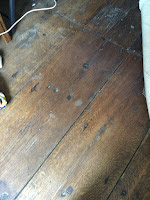If only walls could talk, was my first thought as I sat in my room in awe of the floorboards held in place with wooden pegs, not nails, the stone windowsills probably close to half a metre thick and the old dark beams holding the ceiling. I was staying in a very old house built in 1673 on the main road of a village called Flookburgh in the Lake District on the northwest coast of England. The reason for my trip was to get a feel for and learn more about the area where my Townson ancestors had come from.
Flookburgh is unlike the higgledy-piggledy villages in the surrounding areas as its houses were built along the main road. It was historically the main cockling village on the peninsula. Collecting cockles and mussels and fishing in the sands and shallow tidal waters was a long tradition of the area. Collecting shellfish is now done by specially adapted tractors. It is often stated that Flookburgh derived its name from a local flat fish, known as the Fluke, many local people say that Flookburgh wasn't named after the Fluke but the Fluke was named after the village.
Map showing drive across the north of England and Flookburgh's location
As a prosperous fishing village, until the end of the 17th century, it had many inns and shops. A couple of disasters possibly led to its demise. In 1669 The Plague was raging in the northwest and the deaths were so great in Flookburgh and caused such terror that bodies were buried in two excavations in a meadow to the west of the village rather than taken to Cartmel Priory, two miles away which was the normal practice.
On 16 May 1686, a fire destroyed a considerable part of the village, probably near the centre with 22 houses and many other buildings destroyed. Despite this, today nine buildings on Main Street are heritage listed and many more in the surrounding area.
It gave me goosebumps staying in such an old house, which would've existed when my Townson ancestors lived in the village, and being on the main road, they most likely walked past it many a time. It's an amazing connection! In the middle of winter, a few days after Christmas 1716, Elizabeth Townson was baptized in the nearby Cartmel Priory. Her parents, John Townson and Elizabeth Askew were my 6 x great-grandparents and were said to reside in Flookburgh. Elizabeth's brother, John and his wife Alice Greenwood, my 5 x great-grandparents were living in Flookburgh when their first son, John was also baptized in Cartmel Priory at the end of Spring 1740.
Baptism records showed that both families moved around the surrounding area and thanks to my host's knowledge and directions, I could walk to many of these little villages and get a feel for how close together they were. She also lent me a book to read on the history of the area which had been written in 1955 from which I learnt more knowledge of the area. This also led to more explorations over the next two days.
.jpg)
No comments:
Post a Comment